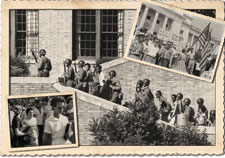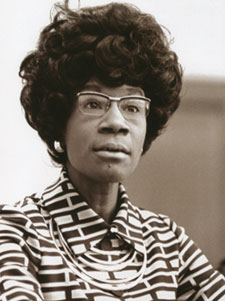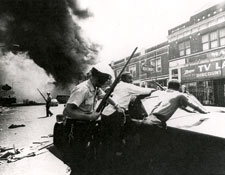Jim Crow Museum
1010 Campus Drive
Big Rapids, MI 49307
[email protected]
(231) 591-5873
In the 19th and 20th centuries, the resistance of African Americans to their oppression was expressed in three general approaches, as illustrated by prominent leaders. Booker T. Washington (1856-1915) stressed industrial schooling for African Americans and gradual social adjustment rather than political and civil rights. Marcus Garvey (1887-1940) called for racial separatism and a "Back-to-Africa" colonization program. W.E.B. Du Bois (1868-1963) argued that African Americans were in the United States to stay and should fight for their freedom and political equality; it was this approach that laid the foundation for the American civil rights movement.
1944 April 3
In Smith v. Allwright, the United States Supreme Court ruled that the "White primary," which excluded black
people from voting, was unconstitutional.
1947 April 10
Jackie Robinson joined the Brooklyn Dodgers, thereby breaking the modern color line
in major league baseball.
1948 May 3
In Shelley v. Kraemer, the United States Supreme Court ruled that lower courts could not enforce restrictive
housing covenants.
1948 July 26
President Harry S. Truman signed Executive Order 9981, which stated, "It is hereby
declared to be the policy of the President that there shall be equality of treatment
and opportunity for all persons in the armed services without regard to race, color,
religion, or national origin."

In Brown v. Board of Education of Topeka, Kansas, the United States Supreme Court ruled unanimously that "separate educational facilities are inherently unequal" and that "the plaintiffs and others similarly situated… are … deprived of the equal protection of the laws guaranteed by the Fourteenth Amendment." The decision outlawed segregation in all public schools in the United States.
1955 August
Emmett Till, a fourteen year-old black youth, was brutally murdered for allegedly
flirting with a white woman in Mississippi. Two white men charged with the crime were
acquitted by an all-white jury. They later boasted about committing the murder. The
public outrage generated by the case helped spur the civil rights movement.
1955 December 1
Rosa Parks was arrested in Montgomery, Alabama, for violating a Jim Crow ordinance.
Her arrest led to a successful citywide bus boycott, which brought Martin Luther King,
Jr. to national prominence.
1957
Congress passed, and President Dwight D. Eisenhower signed, the Civil Rights Act of
1957. This law was largely ineffective.
1957 January
A group of 60 African American ministers formed the Southern Leadership Conference
on Transportation and Nonviolent Integration, which was renamed The Southern Christian
Leadership Conference (SCLC) later that year. Martin Luther King, Jr. was the organization's
first president. The SCLC, an organization founded on the principles of nonviolence
and civil disobedience, became a major force in organizing the civil rights movement.

President Dwight D. Eisenhower ordered federal troops into Little Rock, Arkansas, after unsuccessfully trying to persuade Arkansas Governor Orval Faubus to give up his efforts to block desegregation at Central High. Faubus and a mob of white people were forced to allow nine African American children to attend school on this day.
1960 February 1
Four black students from North Carolina Agricultural and Technical College staged
a sit-in at a segregated Woolworth's lunch counter in Greensboro, North Carolina.
Although they were refused service, they were allowed to stay at the counter. The
event triggered many similar nonviolent protests throughout the South, and also inspired
the founding of the Student Nonviolent Coordinating Committee (SNCC), which gave young
black people a more vital role in the fledgling civil rights movement.
1960 May 6
President Dwight D. Eisenhower signed the Civil Rights Act of 1960, which prohibited
intimidation of black voters and gave judges power to appoint referees to oversee
voter registration.
1961 March 6
President John F. Kennedy issued Executive Order 10925, which created the President's
Committee on Equal Employment Opportunity and mandated that projects financed with
federal funds "take affirmative action" to ensure that hiring and employment practices
are free of racial bias.
1961 May 4
The Congress of Racial Equality (CORE) sent student volunteers on bus trips to test
the implementation of new laws prohibiting segregation in interstate travel facilities.
One of the first groups of "freedom riders" encountered its first problem two weeks
later, when a mob in Alabama set the riders' bus on fire. The program continued, and
by the end of the summer 1,000 volunteers-black and white-had participated.
1963 Spring
Martin Luther King, Jr. was arrested in Birmingham and wrote his seminal Letter From Birmingham Jail, arguing that individuals have the moral duty to disobey unjust laws.
1963 June 12
Medgar W. Evers, NAACP field secretary in Mississippi and a World War II veteran,
was shot and killed by a sniper in Jackson. The alleged assailant, a white segregationist,
was acquitted by a hung jury. In 1994, Byron De La Beckwith was convicted of killing
Evers.

Civil rights demonstrations, protests, and boycotts occurred in every major urban area in the country.
1963 August 28
The civil rights movement reached its peak when 250,000 black people and white people
gathered at the Lincoln Memorial for the March on Washington for Jobs and Freedom,
which included the demand for passage of meaningful civil rights laws. Martin Luther
King, Jr. delivered his famous I Have a Dream speech.
1963 September 15
Four young girls (Denise McNair, Cynthia Wesley, Carole Robertson, and Addie Mae Collins)
attending Sunday school were killed when Robert Chambliss and other members of a white
supremacist group ignited a dynamite bomb at the Sixteenth Street Baptist Church,
a popular location for civil rights meetings in Birmingham. Riots erupted, leading
to the deaths of two more black youths.
1963 November 22
President John F. Kennedy, a supporter of civil rights for African Americans, was
assassinated.
1964 January 23
The 24th Amendment to the Constitution of the United States abolished the poll tax,
which had been instituted in southern states after Reconstruction to make it difficult
for poor black people to vote.
1964 July 2
President Lyndon B. Johnson signed the Civil Rights Act of 1964, making segregation
in public facilities and discrimination in employment illegal.
1964 July 3
Lester Maddox and a throng of supporters wielding axe handles forcibly turned away
three black activists who tried to eat at Maddox's restaurant, the Pickrick. Maddox
was elected Governor of Georgia in 1966.
1964 August 4
The bodies of three civil rights workers, two white and one black-Andrew Goodman,
20; Michael Schwerner, 24; and James E. Chaney, 21- were discovered buried near Philadelphia,
Mississippi. They had been registering black voters in Mississippi, and, on June 21,
had gone to investigate the burning of a black church. The FBI accused nearly two-dozen
white segregationists of complicity in the murders, including law enforcement officers.

A Voter Registration Drive, led by Martin Luther King, Jr., was launched in Selma, Alabama and throughout the state. On March 7, black voting-rights activists began the fifty-mile march from Selma to Montgomery. They were viciously attacked by police. The national response to violence against the marchers contributed to the passing of the Voting Rights Act.
1965 February 21
el-Hajj Malik el-Shabazz, previously known as Malcolm X, was assassinated while speaking
to the Organization of Afro-American Unity in New York City.
1965 June 4
In a speech to the graduating class at Howard University, President Lyndon B. Johnson
framed the philosophy underlying affirmative action, asserting that civil rights laws
alone were not enough to remedy the effects of past discrimination.
1965 August 11
The Watts area of Los Angeles exploded in violence following the arrest of a young
black motorist. After 6 days of unrest, 34 people had been killed, more than 1,000
were injured, and 3952 were arrested. The National Guard assisted in quelling the
disorder.
1966 October
The Black Panther Party for Self-Defense was founded in Oakland, California, by Huey
Newton and Bobby Seale.
1967
Thurgood Marshall became the first African American to serve as Associate Justice
of the United States Supreme Court.
1967 May 1-October 1
The worst summer of racial disturbances in United States history occurred. More than
forty outbreaks were recorded; the most serious were in Newark, New Jersey (July 12-17)
and Detroit (July 23-30).
1967 June 12
In Loving v. Virginia, the United States Supreme Court ruled that prohibiting interracial marriages was
unconstitutional. Sixteen states that banned interracial marriage at the time were
forced to revise their laws.
1968 April 4
Martin Luther King, Jr. was assassinated in Memphis, Tennessee, where King was speaking
in support of striking sanitation workers. The assassination was followed by a week
of violent disturbances in at least 125 cities across the nation, including Washington,
D.C.
1968 April 11
President Lyndon B. Johnson signed the Fair Housing Act, prohibiting racial discrimination
in the sale, rental, and financing of most housing units in the country.

Shirley Chisholm, the first black congresswoman, was elected by New York's Twelfth Congressional District.
1970 May 14
Mississippi law enforcement officers killed two young black Americans at Jackson State
College, a historically black institution.

Violent racial clashes connected with school desegregation occurred in northern and southern cities. In Pontiac, Michigan, tensions were high after a court decision ordered desegregation of the public schools. A car near Pontiac Central High School struck down a black student on October 7, as white and black students continued a two-day battle with rocks and bottles.
1971 April 20
The United States Supreme Court, in Swann v. Charlotte-Mecklenburg Board of Education,
upheld busing as a legitimate means for achieving the integration of public schools.
Although largely unwelcome (and sometimes violently opposed) in local school districts,
court-ordered busing plans in cities such as Charlotte, Boston, and Denver continued
until the late 1990s.
1972
The "Tuskegee Study of Untreated Syphilis in the Negro Male" ended. Begun in 1932,
the United States Public Health Service's 40-year experiment on 399 black men with
syphilis was described by news anchor Harry Reasoner as an experiment that "used human
beings as laboratory animals in a long and inefficient study of how long it takes
syphilis to kill someone."